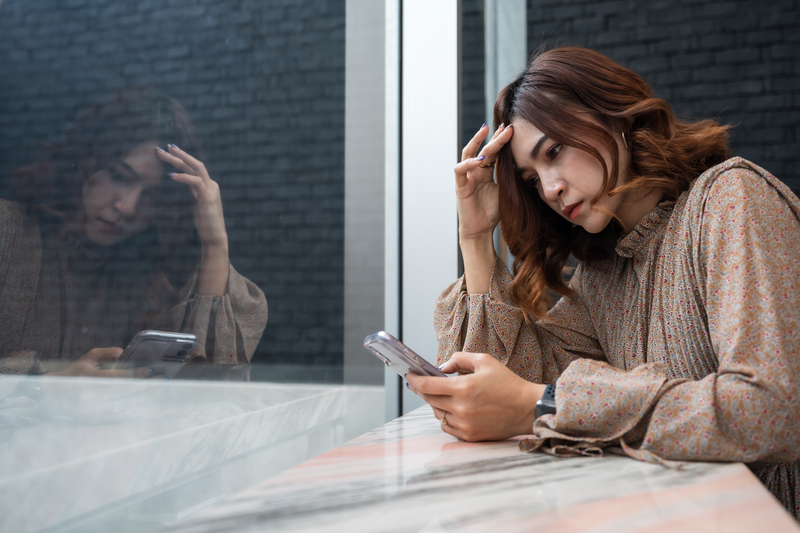Smartphone Addiction: Are You Addicted to Your Devices?

Where is your smartphone right now? Chances are pretty good that you’re staring at it, and if you’re not on your phone, it’s within arm’s reach. Smartphones are a part of our lives now, and most of us will agree that we rely on them for any number of things and spend more time on them than we ever thought possible. Is a smartphone simply a tool we rely on, a device we depend on, or have many of us crossed the line and developed a smartphone addiction?
If you’re finding you spend an alarming amount of time on your devices, you aren’t alone! We can’t seem to stay off of them. Not only do we use them for texts, calls, email, and reminders, but they are our calendars and our connection to the outside world—from Facebook/Instagram to friends to global news. They’re used for work and personal life, as our cameras, for convenient shopping and banking, as weather forecasters, for learning and entertainment, and so much more.
By some estimates, the average person spends an entire day every single week on her phone. That includes checking the phone every 12 minutes (or 47 times per day) to answer texts, read emails, scroll through social media, check the news, or watch a funny video.
It’s not surprising, though, as they’re so portable, convenient, and seem to be improving every year. What used to be seen as a luxury has developed into a necessity for most people in our society, leading up to 71% of folks to sleep next to their phones. Now, 66%, or 2 out of 3, people show signs of struggling with smartphone addiction. 1
What is Nomophobia?
Do you have a fear of being without your phone? Well, there’s a word for that: nomophobia. First coined in 2008 and becoming People’s Word of the Year for 2018, an estimated two-thirds of the population suffers from nomophobia. 1,2 Every year, more and more people are growing addicted to their smart devices, especially younger people.
This is concerning as 54% of teens self-report spending too much time on their phones, 72% report checking their phones immediately upon waking up, 40% say they feel anxious when they don’t have their phones on them—with 56% reporting they feel lonely or upset if their phone isn’t within reach. 2
We don’t yet know the implications of all of that time spent on the smartphone. The human brain is still developing until we reach about 25 years old, so those teens and young adults who become dependent on their phones may be altering how their brains develop. 2 Statistics are starting to indicate the results aren’t good with teen suicide rates for girls increasing by 65% and many reporting an increase in loneliness and depression with increased smartphone use.
It’s not just young people, though. Thirty-six percent of adults say they spend too much time on their cell phones. 2 We check our phones throughout the day (unlocking our phones up to 150 times per day) even when we’re doing something else like spending time with family and friends, taking a walk, or crossing a street. 1 We’re even on our phones when watching TV. Worse, up to 59% of people in the U.S. use their phones while driving despite the fact that using a smartphone while on the road is more dangerous than drinking and driving. In fact, one out of four car accidents is caused by texting while driving. (That’s six times higher than drunk driving.) 3
Average phone users touch their phones 2,617 times per day, and heavy phone users (those in the top 10%) touch their screens 5,427 times per day over the course of 145 minutes to 225 minutes. Eight-seven percent of the population checks their phones between 12:00 a.m. and 5:00 a.m. when the vast majority of us should be sleeping! 2 One in three smartphone users would rather give up sex than their phones. (Wow!)
Symptoms of Smartphone Addiction
Are you suffering from nomophobia? Some of the symptoms include:
- Panic if you can’t find your phone
- Panic when no service is available
- Worry that people won’t be able to reach you if you don’t have your phone
- Anxiety when the battery for your device is low
- Spending more time online than in your normal routines
- Withdrawing from friends and family and spending time on the phone instead
- Sleeping with your smartphone
- Using your smartphone in dangerous situations, such as driving or crossing a street
- Having no sense of time when using the phone
- Using the phone even during social gatherings or family time
- Feeling like your phone has buzzed or like you got a notification even when you haven’t
- Eye strain and soreness from spending too much time staring at screens
- Insomnia
- Feeling restless if you don’t have your phone on you
Dangers of Smartphone Addiction
This smartphone addiction conversation has to be overblown, right? After all, cell phones are an important part of life now, and “everyone” needs to be connected.
It is true that there are countless benefits of smartphones, but it’s all about balance. Does your device assist you or has it become your master—your go-to for social and emotional interaction, entertainment, to cure loneliness, boredom, or depression? Unfortunately, though it can provide instant gratification—often immediately relieving uncomfortable feelings—that gratification is short lived, typically leading to greater discomfort moments later. We get an instant high with a rush of dopamine (the feel-good neurotransmitter that floods the system when we do something we enjoy, like get a hug from a loved one or get 25 likes on a social media post). However, in the long run, all that time on devices drives us further from authentic human interactions, real life, and what’s really important.
Want proof? Smartphone users spend an average of 3 hours and 15 minutes per day on their devices. Sadly, they spend less than 45 minutes per day in quality time with family. 1 Fifty-eight percent of us can’t go a full hour without checking our phones. That number is even higher for younger people (ages 18 – 34), and more than half of smartphone users leave their devices on 100% of the time.
There are also physical ramifications. Smartphone usage can lead to neck and back pain. Plus, all that blue light exposure can be damaging to the eyes, disturb normal sleep patterns, and can even lead to health complications. Blue light use in the dark, for example, has been found to speed up blindness; so please don’t use your phone at night in the dark. 4
Finally, there’s evidence that humans are being “downgraded” by our device dependance. That is, many of our basic faculties, such as memory, social interpretations, attention spans, and focus are being depleted. Research has found that smartphone addiction can physically affect brain size. For example, one small study suggests it can lead to decreased gray matter (brain) volume as well as less activity and volume in the right anterior cingulate cortex. 5 This part of the brain is associated with impulse and emotion control, decision making, and empathy.
Can You Beat Your Smartphone Addiction?
Up to 63% of smartphone users are trying to limit their phone usage, 40% say they use their phones too much, and around 30% are successful at using them less. Some workers (43%) simply turn off their phones to avoid distractions, and around half of them find that’s an effective way to increase productivity.
So, if you’re one of the many who’s ready to limit the distractions and commit to more time in the “real world,” what can you do? Can you break your smartphone addiction?
The answer is absolutely yes. Look at the 30% of people who have been successful and see what they do. You don’t have to turn off your phone and leave it in the glove compartment of your car parked three blocks away, either. In fact, as with many new habits, it may be best to start small.
Here are 10 ways to help you cut down your smartphone usage without feeling left out:
1. Track your usage so you can know how much you’re using your phone now. Then set goals to use it less. You will likely be surprised by how much time you really spend on your phone (and away from everything else).
2. Start creating phone-free zones within your house. Old-school alarm clocks can be purchased for just a few bucks, so why not leave your phone outside of your bedroom? Better yet, turn the phone off or into Zen mode for the hours you know you should be sleeping (e.g., 11:00 p.m. to 6:00 or 7:00 a.m.) to remove the temptation.
3. Leave the phone tucked away or in another room whenever you’re eating—especially when eating with family and friends. Reserve that time so you don’t answer the phone even if it rings. You can better enjoy the meal and the conversation, and as an added bonus, it may help you lose weight as you eat more mindfully.
4. Move your phone to another room, turn it off, or use an app to turn it to Zen mode when you’re doing focused work.
5. Set aside time to check your phone—such as during a coffee break—but keep it down to just a few times per day.
6. Simply turn your notifications off. Do you really need all of those interruptions? You can also delete unnecessary or distracting apps, so your phone isn’t constantly begging for your attention. You can always leave notifications on for the applications you want (such as text messages or calendar reminders) and remove them for things that aren’t as important (such as social updates, games, or news stories). You can always reinstall an app if you find that you do actually need it. (Chances are that, for most of them, you won’t.)
7. The goal is to create “protected time”, or scheduled time, for undisturbed work, social engagements, or relaxation when you can turn off your phone and simply be unavailable.
8. Make a list of things you love to do that don’t include your phone: playing games with the family, reading a book, hiking, wandering through a forest or by a body of water, chatting with a friend over a beer, cocktail, or mocktail. Now, post that list where you can see it. When you’re feeling bored, lonely, or just want something to do, you can pull from that list instead of automatically picking up your phone.
9. Leave home without your phone. Perhaps you take the dog(s) for a walk or even drive to the grocery store. Even a few minutes or a quick trip without your phone can help you realize that you really don’t need it with you all the time. You can gradually extend the amount of time without your phone until you can spend a full day (or even weekend or full vacation!) without a device. It is possible.
10. Perhaps most importantly, please don’t use your smartphone while driving! Make a rule for absolutely no texting or social media while on the road. If you do need your smartphone to tell you where to go, set it up and hit start before you begin your journey (or at least when parked) rather than while speeding down the highway at 75 mph. This isn’t just for you but for the safety of all those with whom you are sharing the road.
Smartphones: For or Against Us?
There’s likely no need to drop your smartphone off at the nearest recycling bin, cancel WIFI, and give up all the technological advantages that come with these fantastic inventions. Smartphones have become an indispensable part of our lives because of their countless benefits. The issues arise only when devices interfere with our relationships and our health. Again, it’s about creating balance.
Check in with yourself and your usage. Set aside time to put your phone away and really reconnect with the real world. Have face-to-face conversations. Enjoy a workout. Spend time in nature—even if it’s just your own backyard or greenspace near your home.
If you find you’re anxious without your phone, it’s likely even more important to set aside times to do without it, so your smartphone moves to its proper place of assisting you rather than controlling you.





 7 Signs Your Body is Seriously Low on Collagen (not just wrinkles)
7 Signs Your Body is Seriously Low on Collagen (not just wrinkles) Health Expert: "Turmeric Doesn't Work (unless...)"
Health Expert: "Turmeric Doesn't Work (unless...)" 3 Warning Signs Your Probiotic Supplement is a Total Waste
3 Warning Signs Your Probiotic Supplement is a Total Waste

